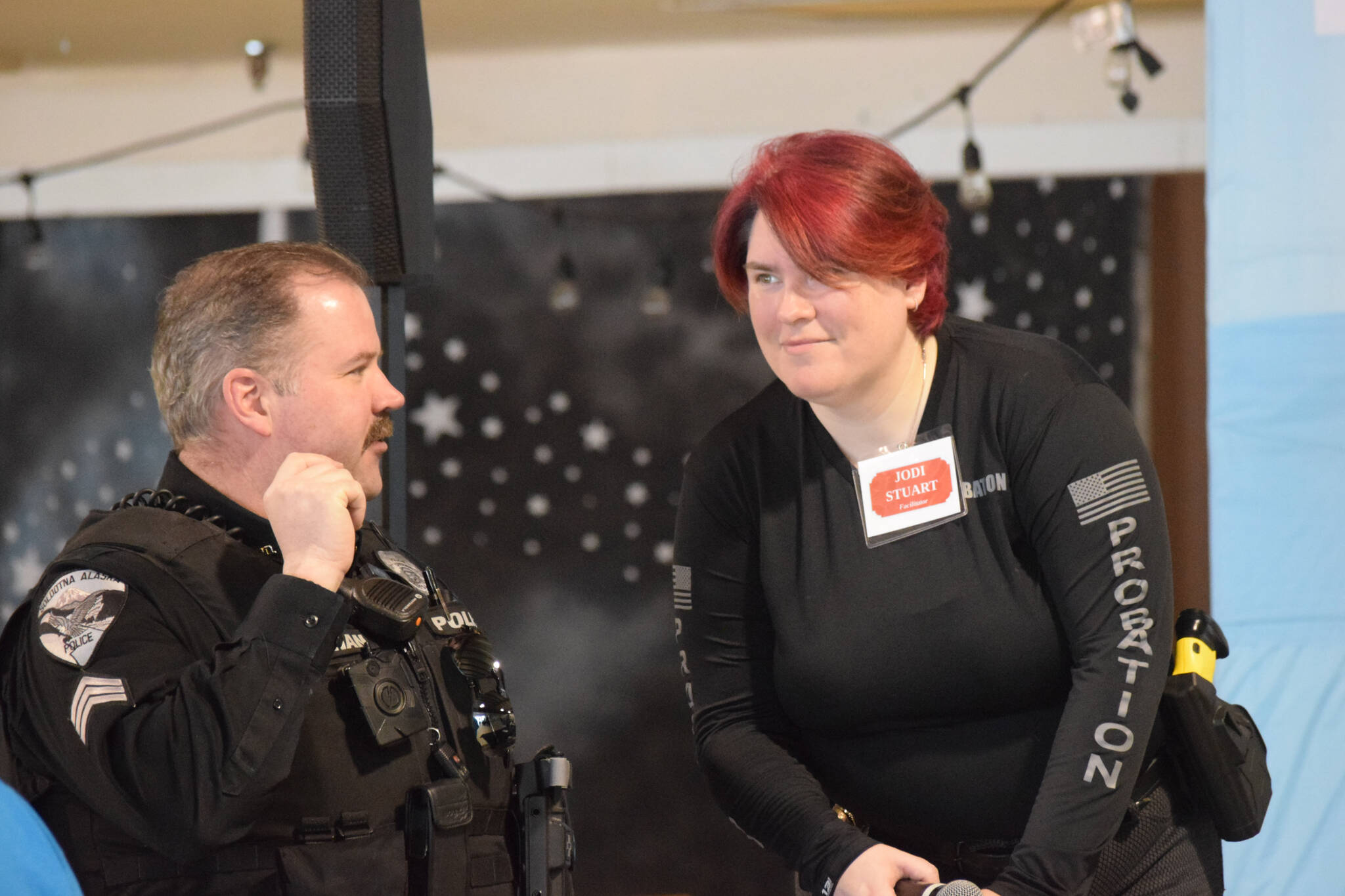This is Sherman: a 36-year-old unemployed man currently residing in a homeless shelter while struggling with a substance use disorder and a major depression diagnosis. And on top of that — he’s a convict.
Sherman was just one of the characters given to participants at the Kenai Peninsula Re-Entry Coalition and Alaska Department of Corrections’ simulation at the Old Carrs Mall on Saturday.
The event, the first of its kind in Kenai, highlighted the unique struggles recently incarcerated people face re-entering society on the peninsula.
Community members and agency leaders were given a persona with a unique set of obstacles to work with throughout the event Saturday. The goal was for each person to successfully attain employment, food and housing security, and attend regular treatment and probation meetings — while avoiding landing back in jail.
But as many participants realized, that was much easier said than done. Some couldn’t pay their rent, others failed urinalysis tests, and many missed mandatory meetings with their parole officers due to lack of transportation.
The Sherman persona, for example, was supposed to seek substance abuse treatment once per week, which costs $15 per visit, check in with the probation office once every two weeks, paying $30 each time, take a urinalysis test each week at $5 per test, on top of figuring out how to pay for rent and food as an unemployed man with a criminal background.
Jodi Stuart, a probation and parole officer with the DOC and advisor to the Re-Entry Coalition, was the main facilitator of the simulation. She said she wanted community members to understand the specifics about re-entry from the corrections system, while also emphasizing the choices that people with criminal records have.
She said there are a lot of people on the Kenai Peninsula who struggle to make ends meet as it is. But with a criminal record, that feat is even more difficult.
“We hear a lot of stories of folks without criminal histories that have barriers, but add a layer to it and it compounds the problem,” Stuart said.
While recognizing the challenges re-entrants face, Stuart said she tries to encourage formerly incarcerated people to have a different mindset upon re-entry.
“We can provide a number of services inside the walls while they’re incarcerated, but it’s ultimately their choice to participate,” Stuart said. “So I think today, if anything, (what) I wanted to get out is people have choice in their criminal processes.”
Katie Cowgill, the program and case manager at the Kenai Peninsula Re-Entry Coalition and a facilitator of Saturday’s simulation, said sometimes simple necessities can impede a person’s ability to thrive after leaving jail or prison.
“It’s like this little thing — I can’t make money until I get a job, and I can’t get a job without a Social Security card and my ID,” she said. “We find that those little things that we can help with actually allow people to flourish in other ways.”
Cowgill started taking clients last year at the Re-Entry Coalition, and according to her experiences, many are at risk of recidivism — or getting arrested again in the first three years of their release — if they don’t have proper access to social services.
“We have an alarming rate of crime here on the peninsula, and all of my clients have substance use disorders,” she said. “So those two things are so interconnected. There’s no way to help these people without getting treatment.”
One of the main issues Cowgill sees is the lack of awareness of these types of social services.
“We have some really amazing service agencies in our community,” she said. “The problem that we often face is that people just don’t know where to go or what’s available. And our job is making that connection.”
Cowgill said she wants the community to know that most of her clients with criminal backgrounds want better for themselves.
“They are some of the most driven people I’ve ever met in my life,” she said. “They want to work so badly, they want to support themselves so badly. I’ve not had one person that didn’t honest-to-goodness want to succeed.”
Of all the participants playing different personas, many bounced in and out of jail during Saturday’s event.
Tammy Ashley, the vice president of the Re-Entry Coalition Board of Directors, was one of the multiple social services vendors at the simulation Saturday. Although she mainly works in Anchorage, she said the issues around re-entry are similar here on the peninsula, if not more prevalent.
“I’m a huge fan of simulations, because it really does enlighten the community of what our re-entrants need to go through in order to be successful,” Ashley said.
Difficulties accessing housing and transportation, as well as stable employment, is something she sees a lot in urban and rural Southcentral Alaska. Ashley said it’s much more complicated than just checking in with a parole officer every once in a while.
“People think all they have to do is go see their PO — it’s so much more than that,” she said.
Joe Thirlwell attended the simulation as a way to further understand the experiences of re-entrants.
“Our son’s in prison, he’s going to be getting out pretty soon,” he said.
Thirlwell said he realized re-entry after incarceration isn’t cut-and-dry.
“We’re just trying to figure out the system because unfortunately, I think it’s designed for most people to fail,” he said. “I’d like to see some changes.”
For more information on the Kenai Peninsula Re-Entry Coalition, visit www.kpreentry.org or call 907-953-1322.
Reach reporter Camille Botello at camille.botello@peninsulaclarion.com.

